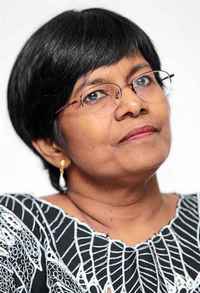
Source of news: The Star Online dated Friday 24-07-2015
PETALING JAYA: Faced with the rising cost of living, some 338,000 disabled Malaysians (OKUs) want more items to be exempted from the Goods and Services Tax (GST).
Currently, only tools and equipment used by the disabled are GST-exempted and do not cover daily costs of upkeep.
Wheelchair-bound Senator Bathmavathi Krishnan (pic) said the move to include basic daily items would not only ease the burden of the disabled but also the families who look after them.
“The exemption should include items like catheters, diapers, daily supplements and food items used for special diets,” she told The Star.
She said allowances given to the disabled were insufficient to cover their needs and families caring for them were forced to dip into their own pockets.
“Under the 11th Malaysia Plan, the Government is targeting to improve the wellbeing of the B40 group (bottom 40% households income group).
“The assessment of this group does not take into account families who care for the disabled,” she said.
Bathmavathi also suggested that allowances for the disabled be increased to about RM500 a month, as the cost of upkeep could range from RM150 to more than RM1,000 depending on the type of disability.
The monthly income of B40 households was RM2,537 last year and there are some 2.7 million households under this group.At present, those caring for a disabled person are entitled to RM300 a month, while a disabled person who is employed is entitled to a monthly allowance of RM350. A disabled person who is unemployed receives an allowance of RM200.
On a separate issue, Bathmavathi, who is the founding president of the Association of Women With Disabilities Malaysia, wants the Government to make it easier for OKUs to enjoy the current exemptions.
“We have to get a certificate from the respective associations or organisation before being allowed to purchase the items we need.
“Many disabled find this process difficult, particularly those who rely on others to move about,” she said.
Bathmavathi said it should be sufficient for disabled persons to rely on their OKU cards for the purpose.
“There are some who are not registered OKUs and this only adds to the problem,” she said.
Under Section 25(1) of the Persons With Disabilities Act, she said an OKU card was conclusive proof of a person’s disability.
She added that the exact number of disabled persons nationwide, which also included impaired elderly persons, could be higher.